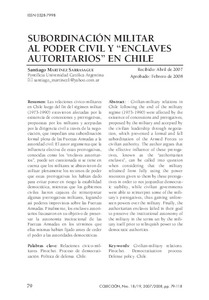Por favor, use este identificador para citar o enlazar este ítem:
https://repositorio.uca.edu.ar/handle/123456789/6857| Título: | Subordinación militar al poder civil y “enclaves autoritarios” en Chile | Autor: | Martínez Sarrasague, Santiago | Palabras clave: | RELACIONES CIVILES Y MILITARES; FUERZAS ARMADAS; TRANSICION DEMOCRATICA; CHILE | Fecha de publicación: | 2008 | Editorial: | Pontificia Universidad Católica Argentina. Facultad de Ciencias Sociales. Departamento de Ciencias Políticas y Relaciones Internacionales | Cita: | Martínez Sarrasague, S. Subordinación militar al poder civil y “enclaves autoritarios” en Chile [en línea]. Colección. 2008, 18-19. Disponible en: https://repositorio.uca.edu.ar/handle/123456789/6857 | Resumen: | Resumen: Las relaciones cívico-militares en Chile luego del fin del régimen militar (1973-1990) estuvieron afectadas por la existencia de concesiones y prerrogativas, propuestas por los militares y aceptadas por la dirigencia civil a través de la negociación, que impedían una subordinación formal plena de las Fuerzas Armadas a la autoridad civil. El autor argumenta que la influencia efectiva de estas prerrogativas, conocidas como los “enclaves autoritarios”, puede ser cuestionada si se tiene en cuenta que los militares se abstuvieron de utilizar plenamente los recursos de poder que estas prerrogativas les habían dado para evitar poner en riesgo la estabilidad democrática, mientras que los gobiernos civiles fueron capaces de reinterpretar algunas prerrogativas militares, logrando así poderes imprevistos sobre las Fuerzas Armadas. Finalmente, los enclaves autoritarios fracasaron en su objetivo de preservar la autonomía institucional de las Fuerzas Armadas en los términos que ellas mismas habían fijado antes de ceder el poder a las autoridades democráticas. Abstract: Civilian-military relations in Chile following the end of the military regime (1973-1990) were affected by the existence of concessions and prerogatives, proposed by the military and accepted by the civilian leadership through negotiation, which prevented a formal and full subordination of the Armed Forces to civilian authority. The author argues that the effective influence of these prerogatives, known as the “authoritarian enclaves”, can be called into question when considering that the military refrained from fully using the power resources given to them by these prerogatives in order to not jeopardize democratic stability, while civilian governments were able to reinterpret some of the military’s prerogatives, thus gaining unforeseen powers over the military. Finally, the authoritarian enclaves failed in their goal to preserve the institutional autonomy of the military in the terms set by the military itself prior to relinquish power to the democratic authorities. |
URI: | https://repositorio.uca.edu.ar/handle/123456789/6857 | ISSN: | 1850 003X (en linea) 0328 7998 (impreso) |
Disciplina: | CIENCIA POLITICA | Derechos: | Acceso Abierto | Fuente: | Colección. 2008, 18-19 |
| Aparece en las colecciones: | COL - 2008 Año XIII-XIV nro. 18-19 |
Ficheros en este ítem:
| Fichero | Descripción | Tamaño | Formato | |
|---|---|---|---|---|
| 808-2678-1-PB.pdf | 166,53 kB | Adobe PDF |  Visualizar/Abrir |
Visualizaciones de página(s)
2.369
comprobado en 30-abr-2024
Descarga(s)
171
comprobado en 30-abr-2024
Google ScholarTM
Ver en Google Scholar
Este ítem está sujeto a una Licencia Creative Commons

